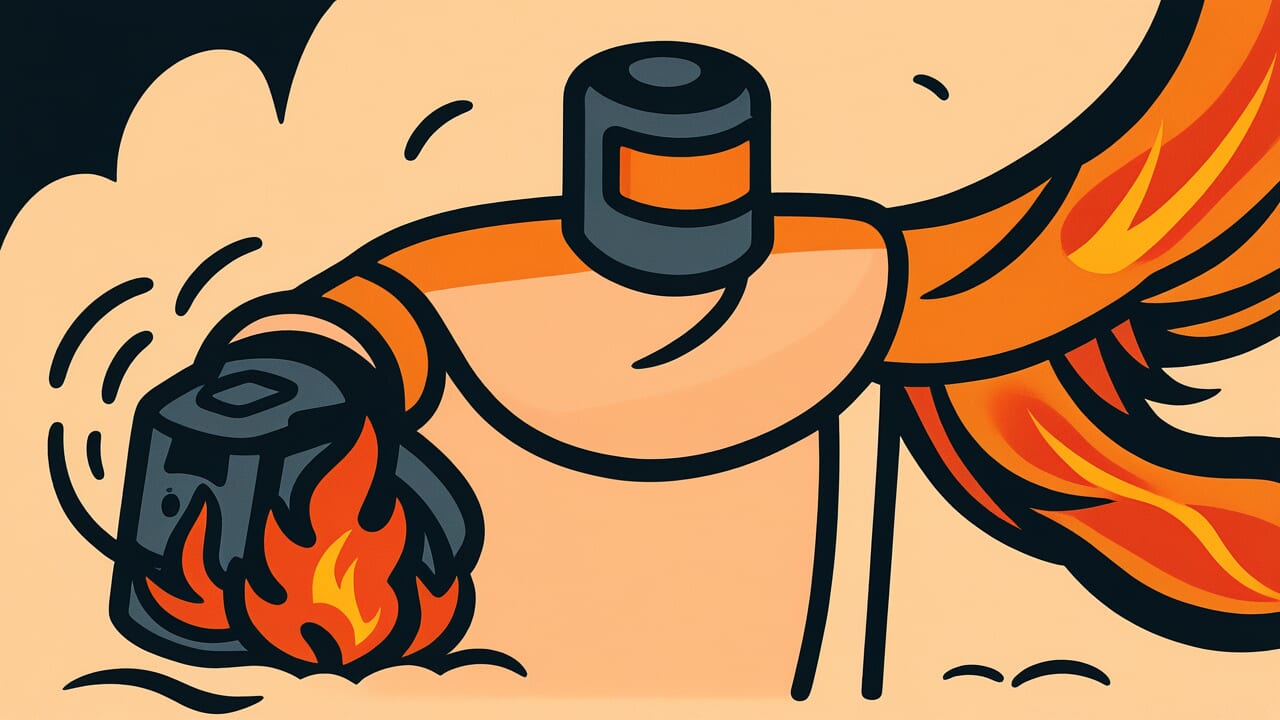How to Read “A fire from a sleeve”
Sode kara kaji
Meaning of “A fire from a sleeve”
“A fire from a sleeve” is a proverb that warns how trivial things can develop into serious matters. A small event like fire catching on a kimono sleeve can eventually burn down an entire house.
The proverb warns that even seemingly insignificant things can lead to grave situations if ignored or taken lightly.
This saying teaches the importance of addressing problems in their early stages. It’s used when warning someone who’s about to overlook small troubles or signs.
It’s also used when arguing that seemingly minor problems should be taken seriously. Even today, this lesson applies to many situations.
Small misunderstandings in relationships, minor mistakes at work, or slight health concerns all fit this teaching. Big problems that could have been prevented with early action often become irreversible later.
This truth remains unchanged from past to present.
Origin and Etymology
The origin of “A fire from a sleeve” has no clear documented record. However, it’s believed to be deeply connected to the fear of fires in urban life during the Edo period.
Edo was a city where fires occurred so frequently that people said “fires and fights are the flowers of Edo.” Wooden houses stood close together, and once fire broke out, it spread instantly.
In such an environment, people paid extreme attention to fire prevention.
Looking at the word “sleeve” in this phrase, kimono sleeves were the body parts most likely to get close to fire in daily life. When cooking, lighting lamps, or warming themselves, the danger of sleeves touching fire was always present.
A sleeve catching fire is itself a small event. But if left unattended, it spreads to the entire kimono, then to the whole house, and potentially to the entire town.
This proverb expresses through concrete imagery how small dangers in daily life can lead to irreversible disasters. Through the familiar and frightening disaster of fire, it conveys the lesson that trivial matters should never be taken lightly.
Usage Examples
- We ignored a small disagreement in the meeting, and it developed into conflict across the entire department. It was truly a fire from a sleeve
- It started as just a light cough, but I kept pushing myself and ended up hospitalized. This is exactly what a fire from a sleeve means
Universal Wisdom
The universal wisdom shown by “A fire from a sleeve” is deep insight into the psychological tendency called “optimism bias.” We instinctively underestimate small problems, thinking “it’s still okay” or “this much is fine.”
Why do people behave this way? Because facing small problems right in front of us is burdensome both psychologically and physically.
Once we recognize a problem, we must deal with it, which takes time and effort. So unconsciously, we underestimate problems and try to postpone them.
But our ancestors learned from experience. They knew the law that small sparks always grow bigger if left alone.
They understood the reality that problems never disappear naturally. Instead, they become more complex over time and harder to handle.
This proverb has been passed down for so long because this human weakness remains unchanged across time. Technology advances and society changes, but the psychology of wanting to postpone problems remains.
The desire to overlook small signs continues as part of human nature. That’s why this warning still resonates with us today.
When AI Hears This
The process of smoldering sleeves burning down entire houses is a classic example of “critical point breakthrough” in complexity science. Fire occurrence actually has clear mathematical boundaries.
In combustion engineering, when combustible material reaches ignition temperature, oxygen supply is sufficient, and heat generation rate exceeds dissipation rate, the system undergoes phase transition from “smoldering state” to “burning state.”
Once this turning point is crossed, there’s no going back.
What’s interesting is that almost no change is observable until just before the critical point. When the sleeve is slightly scorched, both temperature rise and smoke amount are gradual.
But the moment the critical point is crossed, even by 0.1 seconds, a positive feedback loop activates. Flames raise surrounding temperature, higher temperature generates more combustible gas, and more gas makes flames even bigger.
This self-reinforcing cycle accelerates exponentially.
Forest fire research shows a critical threshold where fires become uncontrollable once burning area exceeds about 3 square meters. Social media firestorms have the same structure.
Initial few critical comments are harmless, but once share counts cross a certain threshold, positive feedback called recommendation algorithms activates, and uncontrollable spread begins.
A sleeve spark creates completely different futures depending on whether the system is before or beyond the critical point.
Lessons for Today
“A fire from a sleeve” teaches modern people to value their sense of discomfort. Our daily lives are filled with small “huh?” moments.
Subtle changes in physical condition, slight discomfort in relationships, small unraveling at work. Dismissing such small signs as “probably just my imagination” is actually very dangerous.
Modern society is busy, and we’re constantly chasing many things. That’s why we feel we have no time to pay attention to small problems.
But this proverb teaches the opposite. Precisely because we’re busy, we should address small problems quickly. Because once they grow bigger, they’ll take even more time and energy.
When your heart feels “something’s wrong,” that might be the moment fire catches your sleeve. That’s when you should have the courage to stop and face it.
Dealing sincerely with small problems isn’t being neurotic. It’s a wise choice to value your own life.



Comments